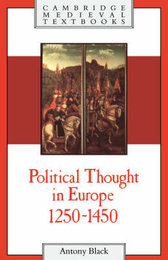
|
Political Thought in Europe, 1250-1450
Hardback
Main Details
| Title |
Political Thought in Europe, 1250-1450
|
| Authors and Contributors |
By (author) Antony Black
|
| Series | Cambridge Medieval Textbooks |
|---|
| Physical Properties |
| Format:Hardback | | Pages:224 | | Dimensions(mm): Height 224,Width 147 |
|
| ISBN/Barcode |
9780521384513
|
| Classifications | Dewey:320.094 |
|---|
| Audience | | Professional & Vocational | |
|---|
|
Publishing Details |
| Publisher |
Cambridge University Press
|
| Imprint |
Cambridge University Press
|
| Publication Date |
20 August 1992 |
| Publication Country |
United Kingdom
|
Description
Why did European civilisation develop as it did? Why was it so different from that of Russia, the Islamic world and elsewhere? In this new textbook Antony Black explores some of the reasons, looking at ideas of the state, law, rulership, representation of the community, and the right to self-administration, and how, during a crucial period these became embedded in people's self-awareness, and articulated and justified by theorists. This is the first concise overview of a period never previously treated satisfactorily as a whole: Dr Black uses the analytical tools of scholars such as Pocock and Skinner to set the work of political theorists in the context of both contemporary politics and the longer-term history of political ideas. The book provides students of both medieval history and political thought with an accessible and lucid introduction to the early development of certain ideas fundamental to the organisation of the modern world and contains a full bibliography to assist students wishing to pursue the subject in greater depth.
Reviews"Not only does Political Thought in Europe, 1250-1450 fill an important gap, but it does so with grace, clarity and vision." Cary J. Nederman, The Review of Politics "The two salient qualities of Political Thought in Europe, 1250-1450 are, first, that it is the product of rethinking, as opposed to being one more restatement of received knowledge, and, second, that it is free of any pet interpretations. Antony Black has no place for ascending and descending theories of authority, as a way of categorizing different concepts of sovereignty, or for Aristotle's political doctrines as the basis of the medieval political outlook. Indeed, he recognizes that there was no single medieval outlook. He also rightly rejects such outdated stereotypes as the corporate character of medieval society." Gordon Leff, Times Literary Supplement
|